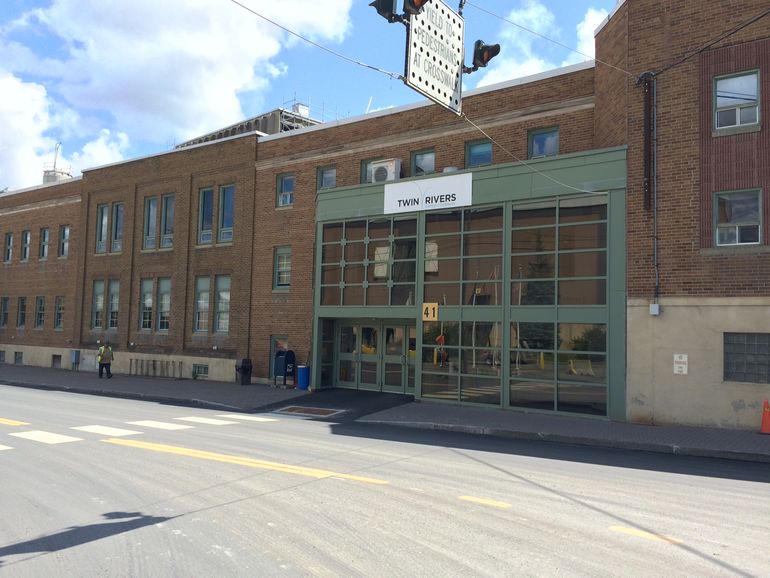
Despite shifts in the industry, Madawaska paper plant optimistic about what's ahead
 Courtesy / Twin Rivers Paper Co.
Twin Rivers Paper Co. in Madawaska is expected to benefit from a new flexible lending arrangement that allows it to focus on asset maintenance on a planned schedule.
Courtesy / Twin Rivers Paper Co.
Twin Rivers Paper Co. in Madawaska is expected to benefit from a new flexible lending arrangement that allows it to focus on asset maintenance on a planned schedule.
Acquisitions in recent years and a major debt restructuring that strengthens its working capital puts Twin Rivers Paper Co. in Madawaska in a sustainable position for the future, the company’s chief financial officer, Tyler Rajeski, told Mainebiz.
Rajeski said he’s optimistic about the industry in general, despite the upcoming closure of a competitor’s mill. Pixelle Specialty Solutions LLC recently announced it would close its Jay mill in the first quarter of 2023.
In September, Twin Rivers said it secured $100 million in asset-based lending credit — with Citizens Bank of Providence, R.I., as the deal’s lead arranger and administrative agent — to refinance the company's debt and for working capital.
Preventative maintenance
Twin Rivers produces packaging, label, kraft, publishing and technical specialty papers as well as dimensional lumber. It employs more than 1,400 people in two countries and seven communities. Maine operations consist of four paper machines in Madawaska.
Rajeski said the flexible lending arrangement allows the company to focus on asset maintenance.

“When people ask what we’re doing with our cash flow, we say, ‘We’re investing in the reliability of our assets,” said Rajeski. “Our customers rely on us to deliver high-quality products on time. Preventative maintenance guards against downtime and equipment failures and helps ensure we can do just that — make paper safely and efficiently and be a long-term supplier our customers can count on, now and well into the future.”
With an eye toward sustaining its own operations for decades to come – and through the downs as well as the ups of market and financial cycles — Twin Rivers’ new credit arrangement is designed to allow the company to tackle upkeep on a planned schedule. Its previous credit arrangement limited the company’s ability to invest in the mill in a timely manner, he said. Part of what made the cash flow challenging was lulls in the market cycles that resulted in reduced earnings – in turn making it hard to reinvest in the business.
Rational planning
The new arrangement provides the flexibility needed to ensure the company can keep up with ongoing maintenance through a rational planning process.
“This will give us more flexibility to maintain investment throughout market cycles,” Rajeski said. “Getting through these cycles requires a collaborative effort with all stakeholders including our lenders, employees and unions.”
The heavy machinery, which is subject to intense pressures and constraints, requires injections of capital that are implemented before things break down, he noted.
“It’s about heat-mapping and identifying which high-risk assets are starting to show signs of age and wear and tear,” he said.
With 500 employees, the Madawaska plant encompasses 550,000 square feet of production space on 30 acres. The plant produces 350,000 tons of paper that’s distributed mostly throughout North America, with some export customers.
“We always strive to keep the mill full and we run the machines 24/7,” he said. “We continually reinvest to avoid down time.”
The goal?
“Long-term sustainability that allows us to reinvest, maintain the employee base and continue to keep jobs in Maine,” Rajeski said.
He added, “Our goal is to maximize the profitability of the volume coming off the machines. We have a great business and we need to invest in the reliability of our assets to ensure we are sustainable in the long-term for the families and communities that rely on us.”
The future of Maine’s pulp and paper industry?
“I think it’s bright,” he said. “What we’ve seen in the last few years is that a lot of domestic customers want to shift their supply chains back to North America, creating a lot of opportunities. We have fantastic employees, great relationships with our customers, and we consistently supply quality paper on time. We’re very optimistic about pulp and paper in North America.”
By partnering with Citizens, Rajeski noted “green” trends are moving in the industry’s favor, as more companies and consumers transition away from plastic. “It’s a sustainability story and there are a lot of trends in the marketplace working in Twin Rivers’ favor,” he said.









0 Comments